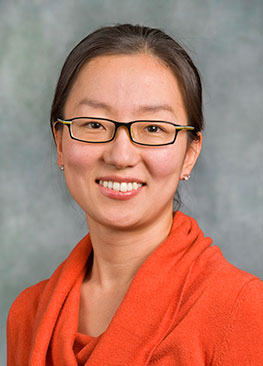Nursing graduate finds passion for research and pathway to PhD after pivoting to BSN program
College of Nursing graduate and research assistant Dillon L. Glenn said his interest in nursing began with an appreciation for human interaction.
 “When I was going through my general education courses, I felt isolated from human contact, and that’s what made me want to explore a nursing career,” he said. “I liked how nursing involved direct human interaction, especially with the human condition, forcing you to consider every aspect of someone’s humanity and provide care for the whole person.”
“When I was going through my general education courses, I felt isolated from human contact, and that’s what made me want to explore a nursing career,” he said. “I liked how nursing involved direct human interaction, especially with the human condition, forcing you to consider every aspect of someone’s humanity and provide care for the whole person.”
Glenn received his associate degree in a high school dual-enrollment program and began his Wayne State education in 2020, studying civil engineering. As he spoke with his mother, a nurse practitioner, about his desire to use his career to make an impact in the community, he transitioned to WSU’s bachelor of science in nursing program.
“My mother was a huge source of motivation in my life. I was able to learn a lot more about the field from her prior to taking the initiative to make the switch academically. The transition was pretty smooth,” Glenn explained.
In his second year at the College of Nursing, Glenn took on a role as a research assistant for Assistant Professor Seung Hee Choi, PhD, RN, working on research analyzing smoking behaviors and their impact on health outcomes. That partnership introduced Glenn to the principles of evidence-based practice and the research involved in developing clinical interventions for smoking addiction.
“We explored the preferences for smoking cessation interventions and partner support in smoker couples. Now we’ve recently submitted a paper for that study,” he said. “Seeing the entire process of a study from beginning to end was an invaluable experience. It was inspiring to be involved in the origins of that work, from the recruitment and experimentation phase and now to the dissemination portion.”
The hands-on research experience with Dr. Choi, combined with his clinical work in the BSN program, helped Glenn better understand the impact of nursing research, the need for nurse scientists and his path forward.

“I’ve enjoyed every minute of it — not just my research but my experiences with Dr. Choi and my clinical training,” he said. “I could see the physiological implications of that work in patients with a history of smoking and alcohol addiction. Being able to care for them while conducting my research on those issues motivated me to pursue a career in nursing science,” he said.
Last summer, Glenn worked as a nurse extern on the neurology unit at Ascension St. John Hospital, where he completed clinical assessments and learned about medication administration over the course of three months.
“That experience focused on why we give certain medications for particular disease processes and looking at hospital culture, which was really fascinating, because I didn’t have that much clinical experience before going into the BSN program,” he said.
At the College of Nursing, Glenn’s BSN education also introduced him to patient populations he ultimately wants to assist through his own research.
“My favorite clinical rotation was in our psychiatric-mental health nursing course at Ascension St. John Hospital, because I was able to truly interact with the individuals I want my research to serve,” he said. “I’m very passionate about addictive disorders, because smokers who also happen to have a mental illness will benefit significantly from tobacco cessation research. I was so grateful for that experience.”
Glenn was also part of Wayne State’s Undergraduate Research Opportunities Program, which invites students across the university to participate in research as undergraduates. This year, he presented the results of his research with Dr. Choi at the UROP Conference and the College of Nursing’s annual Urban Health Research Conference.
While human interaction and holistic approaches to nursing have helped motivate Glenn’s career ambitions and path to graduation, he also aspires to be an inspiration to those around him.
“I would love to set an example for young Black men and my younger family members,” he said. “I want to be a source of knowledge for them and an inspiration.”
As he prepares to graduate, Glenn has decided to continue his education and pursue his PhD at the College of Nursing. He aims to enhance his expertise on smoking research to advance impactful clinical interventions and better understand the social implications of this work.
“I want to continue working with Dr. Choi and specialize in tobacco research but more from a sociobehavioral lens,” he explained. “I want to further explore the social perceptions and the preferences of psychopharmacological cessation interventions among smokers. I believe this social research will add to the academic conversation as it incorporates an individualized approach.”
While he’s focused on research, Glenn also plans to earn his registered nurse licensure to be better equipped to carry forward the clinical impact of his work as a nurse scientist.
“I always say keep in mind the opportunities you don’t see directly in front of you, and don’t be afraid to create your own opportunities,” Glenn noted. “When I became truly immersed in research, that’s when I discovered that it’s the best direction for my future.”